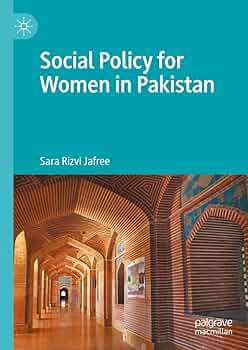
Sara Rizvi Jafree’s seminal work Social Policy for Women in Pakistan (published by Springer in 2023) is a remarkable and comprehensive examination of the intricate challenges faced by women in Pakistan and the compelling argument for an all-encompassing social policy protection framework. Jafree’s meticulous approach, underpinned by extensive research, delves deep into the issues women confront and lays out a compelling case for immediate action. The core of the book revolves around six pivotal aspects of social policy protection, each scrutinized in separate chapters. Jafree opens with a panoramic view of the current social protection landscape in Pakistan. This serves as a foundation for comprehending the existing gaps and deficiencies in safeguarding women’s rights and overall well-being. One of the book’s notable strengths is the incorporation of pertinent case studies and qualitative accounts from diverse regions of Pakistan, including Gilgit-Baltistan, Punjab, and Sindh. These personal narratives imbue statistics with humanity and offer readers a profound insight into the challenges and requirements of women in these communities.
The subsequent chapters dive into different areas of concern. Jafree navigates through the intricacies of family safety and housing adequacy, underscoring the dire necessity for secure living conditions and protection from domestic violence. She delves into the social fabric, exposing the vulnerabilities that persist and urging for reforms to ensure a safer environment for women.
Moving forward, Jafree addresses the critical issues of food security and nutritional adequacy. She effectively highlights the inextricable link between women’s nutrition and overall societal well-being. The book underscores the urgent need to implement policies that guarantee not only access to food but also ensure its quality and nutritional value for women across the nation.
Environmental concerns and disaster protection are discussed with a specific focus on their disproportionate impact on women. The author emphasizes the importance of integrating gender-sensitive policies into disaster preparedness and recovery efforts, recognizing that women are often the most affected in these trying times.
The chapters that follow scrutinize educational development and employment opportunities through the prism of gender disparities. Jafree argues that improving access to education and formal sector inclusion is pivotal for empowering women and reducing the gender chasm in the workforce. By addressing these disparities, not only will women’s economic prospects improve, but it will also contribute to the overall growth and development of the nation.
Health security takes centre stage as a key concern. The book passionately advocates for comprehensive healthcare coverage for women, recognizing that access to quality healthcare services is paramount for addressing maternal mortality and other pressing health-related challenges. Jafree makes a compelling case for a healthcare system that is not only accessible but also culturally sensitive and gender-responsive.
In the final chapters, Jafree provides a set of key recommendations for enhancing social policy protection for women in Pakistan. She underscores the importance of fostering regional collaboration among South Asian countries to share knowledge and best practices. Experiment-based pilot projects are proposed as a means to test and refine policy interventions before scaling up.
In conclusion, it is a seminal and carefully researched work that illuminates the urgent issues confronting women in Pakistan. Jafree’s evidence-based approach and well-considered recommendations make this book an invaluable resource for policymakers, scholars, activists, and anyone committed to advancing gender equality and social justice in Pakistan and beyond. The book serves as a compelling call to action, reminding us of the pressing need to address the multifaceted challenges faced by women in Pakistan. It challenges policymakers and advocates to reassess existing policies and adopt a more inclusive and gender-sensitive approach to social protection. Jafree’s dedication to bridging the gender gap and promoting women’s rights is evident throughout the book. Her research is not just academic; it is a heartfelt plea for change. As readers, we are left with a profound sense of responsibility to ensure that the recommendations put forth in this book are not merely words on paper but actions that will transform the lives of women across Pakistan.
Social Policy for Women in Pakistan is a comprehensive, enlightening, and visionary work that merits the attention of a wide range of audiences. It is a blueprint for creating a more equitable and just society where women are not only protected but also empowered to thrive and contribute meaningfully to the nation’s progress. Jafree’s work is a catalyst for positive change.
***
Adhvaidha Kalidasan is a Lecturer in Professional Communication at the School of Communication and Design, RMIT Vietnam (Ho Chi Minh City).
[…] post Social Policy for Women in Pakistan by Sara Rizvi Jafree (2023): A Review by Adhvaidha Kalidasan appeared first on Doing […]